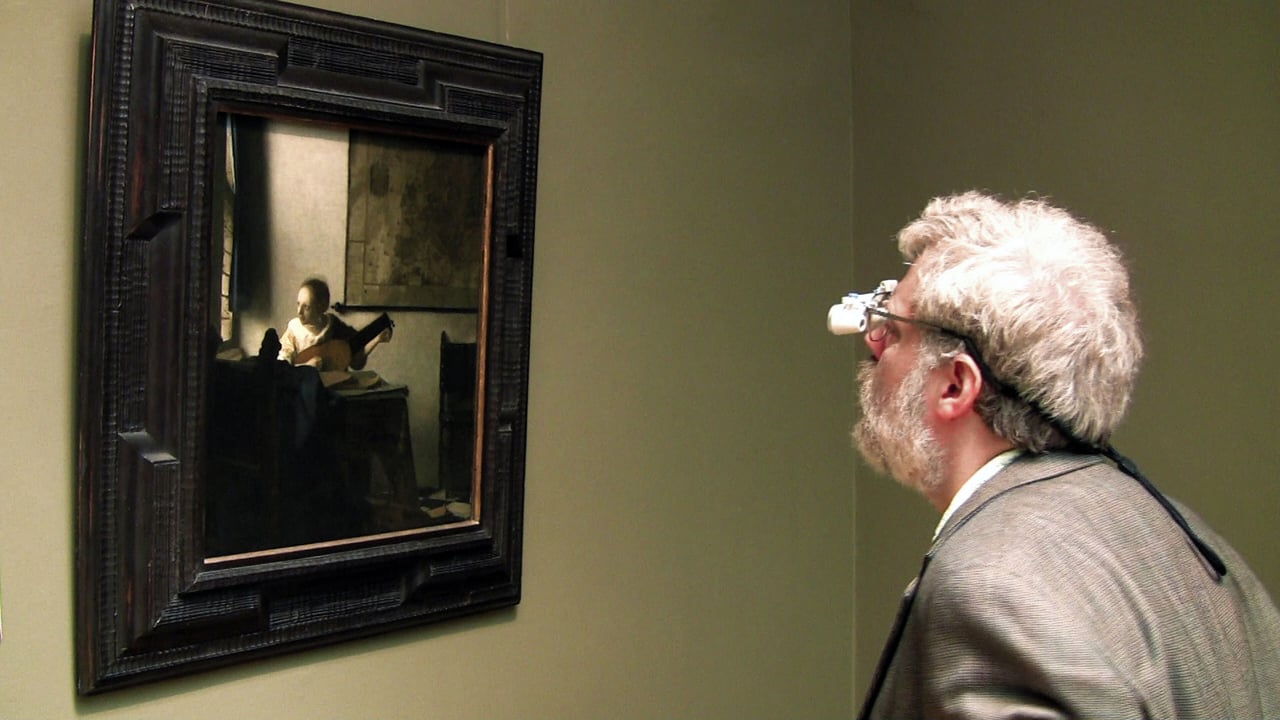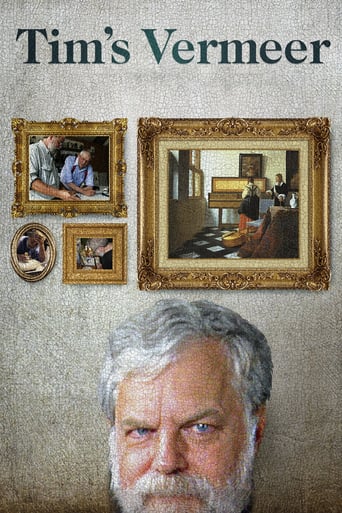

This is the story of a magic trick. By the half time I was rooting for Tim. I knew he would finally get the good product. Or else there was no movie. So the happy end is obvious once you get past the introduction. But there were nice twists. And the building of the background, than of the painting were made interesting, when they were quite boring. So probably the showbiz skills of Penn and Teller are weighting in quite a lot. But it is a cheat. The description, including the extra mirror were already described by David Hockney some 7 years before this documentary project even started in the book called Secret Knowledge: Rediscovering the Lost Techniques of the Old Masters. Me, I was left with the impression that Tim did it all, when in fact his merit might be limited to a 3D description of the original painting (improbable) and for coming up with a simple device known from the late Middle Ages called Camera Lucida. No, in fact, he was the director of the whole construction site and he did the very impressive 130 (?) days of paint including an attempted suicide involving carbon monoxide. He did prove that David Hockney is right and the books comparing Vermeer's so called style are pure bull.Which reminds me of the Bullet Catch trick done by Penn and Teller. It is only a trick. Like Tim who did not discover the device, Penn does not catch a bullet shot from a gun. But it is a good show. And it is still there to prove something: that science could win over the ignorance of art critics.Contact me with Questions, Comments or Suggestions ryitfork @ bitmail.ch
... View MoreThis is the first time I write a review in IMDb, and first things first, sorry for my bad English. This documentary -reccomended by a friend who has a degree in Fine Arts- is made, in my point of view, by and with people who doesn't know nothing about art, and in particular, painting. There's no real mystery in the art of Vermeer. The only mystery to me is how much money has this Tim whatever to make his whim reality. For me, this documentary doesn't has anything to do with the art of painting. It's the mere tale of a "savant" with an intelligence of and autistic, so much money in his pockets and a bit of boredom who decides to copy a Vermeer's painting. That's all. The scenes where shows his "technique" and results to their ass-lickers are hilarious and ridiculous. Seeing an extremely senile David Hockney bowing his head in agreement with the stupid theories of "Tim" are embarrassing. And the final "painting" is horrible as well. Is the painting of somebody who's not a painter -he says it-, a picture without soul. I'm an "aficionado" of the history of art and some of the "mysteries" of the documentary are not. For example, that Vermeer didn't leave any traces of retries or sketches in the canvas, so what? All the venetian painters of the XV and XVI had the tradition of painting directly in the canvas, without previous sketches (Tintoretto, Tiziano, Veronés, Giorgione, the Bellini brothers...), and no one has hit the roof about that. Oh, excuse me, there's a recent crappy best seller and a movie with Scarlett Johanson about the life of Vermeer... That explains all. The inhabitants of United States -not Americans, you're not the only people living in this continent- are very peculiar. It seems they see us -the europeans- as martians or something. I don't understand their talent in technical stuff and, opposite of that, their absolute ignorance about the most basic things. In this case the simplest conclusion is this: Vermeer used the camera obscure, just like the most Flemish painters of the XVIIth century. Period. The only detail is that he had more talent than most of the rest. I would like to see if Tim could "copy" the Garden of Delights of El Bosco. I don't think so. You don't become a genius with a couple of lenses and mirrors. By the way, as documentary, is below average. I recommend the "Palette" series by Alain Jaubert.
... View MoreI would imagine that only art students or avid art collectors would know the name Vermeer if it was spoken out loud, where the rest of us would have to Google his name and learn about this name. Vermeer is actually a name, well a last name in Johannes Vermeer, who was a great painter in the 1600s. His work is known all over the world and is sought after by royalty, celebrities, and very wealthy business people. What makes Vermeer standout than any other painter from the 1600s? Well that's an interesting topic and question. It's such a fascinating subject, that Penn and Teller (the magicians and entertainers) decided to make one of their famous documentaries about it.This matter is is of great interest because Vermeer's paintings are photo-realistic. That is odd, because, it would be very difficult or impossible to capture the lighting, shades, and intricate details that Vermeer captured in his paintings if he did it free hand from memory, which he and people claimed he did. Since Penn and Teller are in the business of calling 'Bullshit', they seemed to have a great beginning to an incredible story, which was how did Vermeer really get the images so detailed in his paintings.Luckily for Penn and Teller, they knew a guy named Tim Jenison, who is a very wealthy technologist, meaning he has invented and sketched the way for new technology over the past few decades. It also means that he might be a bored billionaire with some interesting hobbies, one of those being Vermeer. Tim had a theory that Vermeer in fact did NOT paint these free hand, but rather used new technology at the time to basically trace his paintings, thus he set out to prove his theory, which took seven years to prove from start to finish. Tim's theory stated that Vermeer used a camera obscura, which was fairly new back in the 1600s, to project an image onto a canvas or wall.The projected image is portrayed upside down, but what Tim figured out is if you place a mirror that reflects that image under your eye and on top of your canvas, you have the image that you can sketch perfectly as if you were tracing it. First off, Tim has never painted in his life. Hell, he didn't even know how to hold a paintbrush correctly, but when he attempted to paint a portrait of someone as a trial run, it turned out spectacular, as if he has painted his entire life.After a few more test runs, Tim decided to try this theory on an actual Vermeer painting, specifically the 'The Music Lesson', because of it's intricate and vivid details on the rug and the lighting from the windows. But Tim didn't want to use modern day technology. Instead, he wanted to recreate what it was like for Vermeer in the 1600s. So, being a billionaire, he constructed the room, according to the painting and used the old equipment that Vermeer would have used to get his photo-realistic paintings. And thus the real story is set in motion as Tim spent eight months painting a Vermeer.We get to see the highs and lows of Tim's psyche as he struggles to finish the painting, even saying to the camera "If this wasn't for a movie, I would have quit already." Tim, Penn and Teller, travel to England to meet with some famous artists who reflect on Vermeer and Tim's theory as well as stop by Buckingham Palace to see the actual Vermeer painting, 'The Music Lesson', which is a comical bit in true Penn and Teller form. Throughout the documentary, seeing Tim paint different sections and how the small details are captured, we start to really believe that Vermeer indeed must have used this technique, even if it took many months to complete.And maybe Vermeer wasn't an artist, but one of the first technologists, just like Tim several hundred years later. In the end, Tim painted a Vermeer, and when he showed other art scholars and collectors his piece, they couldn't believe it and said it might just be better than the original. 'Tim's Vermeer' is a short, fun, and interesting documentary about one man's adventure to prove that a celebrated artist might have used technology to help him paint.
... View MoreFunny how the question of genius still preoccupies us; what is that untouchable quality that makes one a genius? Not funny how the usual answer our era gives to that question is some kind of how - not who - dunnit, that actually masquerades what one can well call the traumatic quality of genius, by transforming it into some kind of expertise, aggressive projection of idealizations, and, eventually, a bland denial that the question of genius even exists.I consider "Tim"'s approach actually loathsome; from the initial premise that had some kind of frisson, the mystery is violated by his bland need to be the smartest boy in the room, in that pal manner bosses have to intimidate their employees.There is no sense of recognition, or even of absurd rivalry (Salvador Dali excelled in that when confronting Vermeer), just a nerd's resentment (at least Mr. Hockney has some smaller talent's resentment in order to prove reductive persuasions about painting)that totally blinds him to the dimension of art as such, or when encountered in the deft, sublime brushwork, let alone simpler facts like one cannot strike the same pose for months, especially when the portraits demonstrate such spontaneity and transience.As it is, the film reads more like a bad omen for cognitivism: what claim humanity had in the once sublime, je ne sais quoi quality of art, it returns as a repressed artless invention, as in the reduction of language - that is essentially poetry - to some elaborate chemicals juicing the brain; or like articles one reads nowadays that promote sex as good for blood circulation and even muscle development; that urge french kissing so that when one grows old will escape drooling. And that is depressing. There is no pleasure in it.
... View More